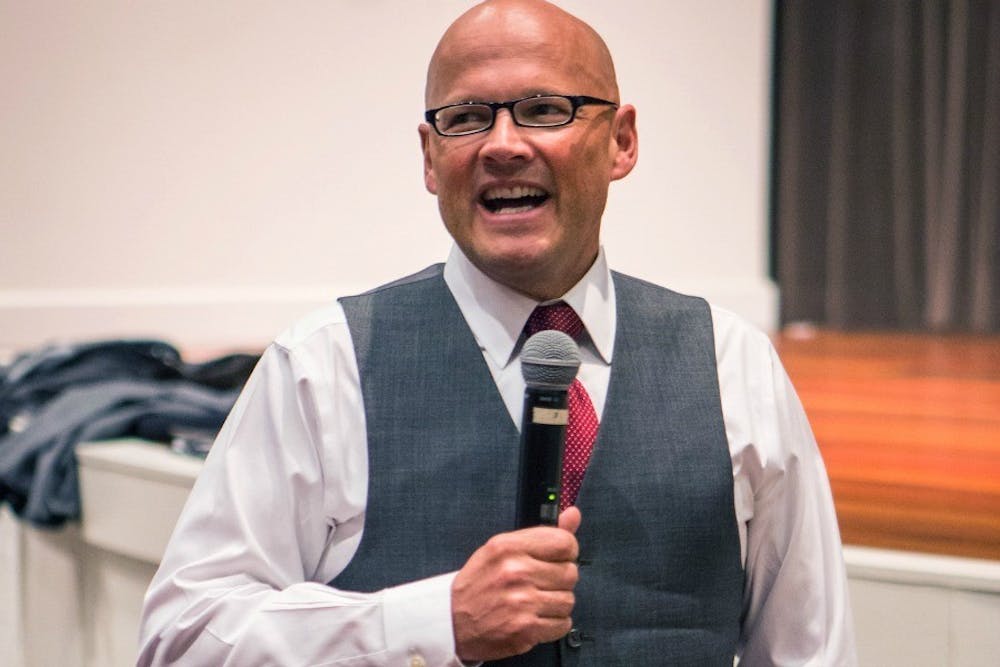Miami University’s Board of Trustees announced that it has added an additional year to President Greg Crawford’s contract, which now spans five years through 2027.
The board also issued Crawford a 4% annual raise as well as a bonus of $75,000 per year. The raise brings his income to $551,665, while the bonus bumps it to $626,665 per year — a figure drastically higher than what an average faculty member makes.
Mary Schell, chair of the Board of Trustees, said in a press release that Crawford’s performance throughout the pandemic played a role in their compensation decision.
“His leadership has been innovative and has kept us focused on our mission to deliver an unparalleled academic experience to Miami students,” Schell said. “The board is pleased with Greg’s leadership and the direction the university is going.”
The Faculty Alliance of Miami (FAM) was quick to point out that the annual nature of the bonus makes it guaranteed income, so in the long-term, Crawford received an 18% raise, while most faculty received 4%.
Cathy Wagner, a professor of English and lead organizer for FAM, said it was disheartening to hear about Crawford’s raise knowing what those at the bottom of the payroll are making.
“Our instructors on regional campuses are the lowest paid in the state, and we have part-timers making under $3,000 a class,” Wagner said. “There’s a class of employees at Miami being treated extremely differently from other classes.”
Wagner stressed she has nothing against Crawford and is more concerned with the pay discrepancy between administrators and faculty. She said Miami reveals its values in the way it allocates money.
James Kiper, a professor of computer science who retired last year, said he didn’t have an issue with Crawford’s raise. Kiper said it’s necessary to pay presidents that amount in order to attract top talent. Crawford’s pay, he said, is the competitive rate the university has to pay to get a good president.
“When you compare [his income] to faculty, it’s probably six to one or seven to one difference,” Kiper said. “Which is nowhere close to the pay difference at big corporations, where executives are making millions.”
Wagner acknowledged that the pay difference highlights the inequality within our society and in higher education.
Enjoy what you're reading?
Signup for our newsletter
“[Pay] doesn’t seem to be in relation to the work that is actually being done,” Wagner said. “It’s the status quo, but that doesn’t mean there isn’t something we could do, we’re not powerless to improve our lives.”
Theresa Kulbaga, a professor of English at Miami’s Oxford and Hamilton campuses, said she was frustrated at the disproportionate raise faculty received, which she noted will not keep up with inflation.
“We’re lucky if we get a few percent annually in the overall merit raise pool, which is not even a pool that applies to all faculty,” Kulbaga said. “It’s the pool that chairs have to decide who gets a 1% raise, who gets 2%, who gets 3% in any given year.”
Kulbaga said the low incomes of non-tenure track faculty is exacerbated by the university’s resistance to their inclusion in the faculty union.
“It reflects the university’s values when precarious faculty are underpaid and are also told they don’t belong in the bargaining unit with tenure-line and tenured professors,” Kulbaga said. “Somehow they’re a different category of employee, even though they do basically the same job.”
Kiper argued that Crawford’s income is fair, though he does think non-tenure track faculty should get better pay. Still, he said, professors should be motivated by more than just money.
“There are reasons that we choose to teach and not take the higher salary jobs, because we like working with students, we like doing research,” Kiper said. “It’s a lifestyle choice that we’re making, not just following the dollar but doing what makes us happy.”
Ashlea Jones, director of executive communications, wrote in an email to the Miami Student that the Board of Trustees came to their decision after reflecting upon achievements made in the previous academic year, including the completion of DEI Task Force recommendations and a record-breaking year for fundraising.
“The average increment pool for this year was 4% for Miami employees, and the Board voted to provide President Crawford with a 4% salary increment,” Jones wrote.




